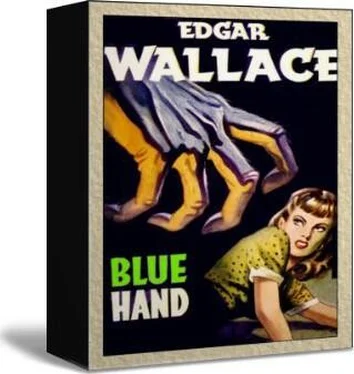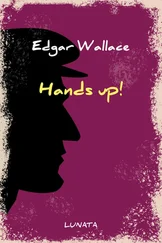Edgar Wallace - Blue Hand
Здесь есть возможность читать онлайн «Edgar Wallace - Blue Hand» весь текст электронной книги совершенно бесплатно (целиком полную версию без сокращений). В некоторых случаях можно слушать аудио, скачать через торрент в формате fb2 и присутствует краткое содержание. Год выпуска: 0101, Жанр: Старинная литература, на английском языке. Описание произведения, (предисловие) а так же отзывы посетителей доступны на портале библиотеки ЛибКат.
- Название:Blue Hand
- Автор:
- Жанр:
- Год:0101
- ISBN:нет данных
- Рейтинг книги:3 / 5. Голосов: 1
-
Избранное:Добавить в избранное
- Отзывы:
-
Ваша оценка:
- 60
- 1
- 2
- 3
- 4
- 5
Blue Hand: краткое содержание, описание и аннотация
Предлагаем к чтению аннотацию, описание, краткое содержание или предисловие (зависит от того, что написал сам автор книги «Blue Hand»). Если вы не нашли необходимую информацию о книге — напишите в комментариях, мы постараемся отыскать её.
Blue Hand — читать онлайн бесплатно полную книгу (весь текст) целиком
Ниже представлен текст книги, разбитый по страницам. Система сохранения места последней прочитанной страницы, позволяет с удобством читать онлайн бесплатно книгу «Blue Hand», без необходимости каждый раз заново искать на чём Вы остановились. Поставьте закладку, и сможете в любой момент перейти на страницу, на которой закончили чтение.
Интервал:
Закладка:
––––––––––––––––––––––––—
Title: Blue Hand (1925) Author: Edgar Wallace
CHAPTER ONE
Mr. Septimus Salter pressed the bell on his table for the third time and uttered a soft growl.
He was a stout, elderly man, and with his big red face and white side-whiskers, looked more like a prosperous farmer than a successful lawyer. The cut of his clothes was queerly out of date, the high white collar and the black satin cravat that bulged above a flowered waistcoat were of the fashion of 1850, in which year Mr. Salter was a little ahead of his time so far as fashions were concerned. But the years had caught him up and passed him, and although there was not a more up-to-date solicitor in London, he remained faithful to the style in which he had made a reputation as a “buck.”
He pressed the bell again, this time impatiently.
“Confound the fellow!” he muttered, and rising to his feet, he stalked into the little room where his secretary was usually to be found.
He had expected to find the apartment empty, but it was not. A chair had been drawn sideways up to the big ink-stained table, and kneeling on this, his elbows on the table, his face between his hands, was a young man who was absorbed in the perusal of a document, one of the many which littered the table.
“Steele!” said Mr. Salter sharply, and the reader looked up with a start and sprang to his feet.
He was taller than the average and broad of shoulder, though he gave an impression of litheness. His tanned face spoke eloquently of days spent out of doors, the straight nose, the firm mouth, and the strong chin were all part of the characteristic “soldier face” moulded by four years of war into a semblance of hardness.
Now he was a little confused, more like the guilty school-boy than the V.C. who had tackled eight enemy aeroplanes, and had come back to his aerodrome with a dozen bullets in his body.
“Really, Steele,” said Mr. Salter reproachfully, “you are too bad. I have rung the bell three times for you.”
“I’m awfully sorry, sir,” said Jim Steele, and that disarming smile of his went straight to the old man’s heart.
“What are you doing here?” growled Mr. Salter, looking at the papers on the desk, and then with a “tut” of impatience, “Aren’t you tired of going over the Danton case?”
“No, sir, I’m not,” said Steele quietly. “I have a feeling that Lady Mary Danton can be found, and I think if she is found there will be a very satisfactory explanation for her disappearance, and one which will rather disconcert—” He stopped, fearful of committing an indiscretion.
Mr. Salter looked at him keenly and helped himself to a pinch of snuff.
“You don’t like Mr. Groat?” he asked, and Jim laughed.
“Well, sir, it’s not for me to like him or dislike him,” he replied. “Personally, I’ve no use for that kind of person. The only excuse a man of thirty can produce for not having been in the war, is that he was dead at the time.”
“He had a weak heart,” suggested Mr. Salter, but without any great conviction.
“I think he had,” said Jim with a little twist of his lips. “We used to call it a ‘poor heart’ in the army. It made men go sick on the eve of a battle, and drove them into dug-outs when they should have been advancing across the open with their comrades.”
Mr. Salter looked down at the papers.
“Put them away, Steele,” he said quietly. “You’re not going to get any satisfaction out of the search for a woman who—why, she must have disappeared when you were a child of five.”
“I wish, sir—” began Steele, and hesitated. “Of course, it’s really no business of mine,” he smiled, “and I’ve no right to ask you, but I’d like to hear more details of that disappearance if you can spare me the time—and if you feel inclined. I’ve never had the courage to question you before. What is the real story of her disappearance?”
Mr. Salter frowned, and then the frown was gradually replaced by a smile.
“I think, Steele, you’re the worst secretary I ever had,” he said in despair. “And if I weren’t your godfather and morally bound to help you, I should write you a polite little note saying your services were not required after the end of this week.”
Jim Steele laughed.
“I have expected that ever since I’ve been here,” he said.
There was a twinkle in the old lawyer’s eyes. He was secretly fond of Jim Steele; fonder than the boy could have imagined. But it was not only friendship and a sense of duty that held Jim down in his job. The young man was useful, and, despite his seeming inability to hear bells when he was wrapped up in his favourite study, most reliable.
“Shut that door,” he said gruffly, and when the other had obeyed, “I’m telling this story to you,” and he pointed a warning finger at Jim Steele, “not because I want to satisfy your curiosity, but because I hope that I’m going to kill all interest in the Danton mystery as you call it for evermore! Lady Mary Danton was the only daughter of the Earl of Plimstock—a title which is now extinct. She married, when she was quite a young girl, Jonathan Danton, a millionaire shipowner, and the marriage was not a success. Jonathan was a hard, sour man, and a sick man, too. You talk about Digby Groat having a bad heart, well, Jonathan had a real bad one. I think his ill-health was partly responsible for his harsh treatment of his wife. At any rate, the baby that was born to them, a girl, did not seem to bring them together—in fact, they grew farther apart. Danton had to go to America on business. Before he left, he came to this office and, sitting at that very table, he signed a will, one of the most extraordinary wills that I have ever had engrossed. He left the whole of his fortune to his daughter Dorothy, who was then three or four months old. In the event of her death, he provided that the money should go to his sister, Mrs. Groat, but not until twenty years after the date of the child’s death. In the meantime Mrs. Groat was entitled to enjoy the income from the estate.”
“Why did he do that?” asked Jim, puzzled.
“I think that is easily understood,” said Mr. Salter. “He was providing against the child’s death in its infancy, and he foresaw that the will might be contested by Lady Mary. As it was drawn up—I haven’t explained all the details—it could not be so contested for twenty years. However, it was not contested,” he said quietly. “Whilst Danton was in America, Lady Mary disappeared, and with her the baby. Nobody knew where she went to, but the baby and a strange nurse, who for some reason or other had care of the child, were traced to Margate. Possibly Lady Mary was there too, though we have no evidence of this. We do know that the nurse, who was the daughter of a fisherman and could handle a boat, took the child out on the sea one summer day and was overtaken by a fog. All the evidence shows that the little boat was run down by a liner, and its battered wreck was picked up at sea, and a week later the body of the nurse was recovered. We never knew what became of Lady Mary. Danton returned a day or two after the tragedy, and the news was broken to him by Mrs. Groat, his sister. It killed him.”
“And Lady Mary was never seen again?”
Salter shook his head.
“So you see, my boy,” he rose, and dropped his hand on the other’s shoulder, “even if by a miracle you could find Lady Mary, you could not in any way affect the position of Mrs. Groat, or her son. There is only one tiny actress in this drama who could ever have benefited by Jonathan Danton’s will, and she,” he lowered his voice until it was little more than a whisper, “she is beyond recall—beyond recall!”
Читать дальшеИнтервал:
Закладка:
Похожие книги на «Blue Hand»
Представляем Вашему вниманию похожие книги на «Blue Hand» списком для выбора. Мы отобрали схожую по названию и смыслу литературу в надежде предоставить читателям больше вариантов отыскать новые, интересные, ещё непрочитанные произведения.
Обсуждение, отзывы о книге «Blue Hand» и просто собственные мнения читателей. Оставьте ваши комментарии, напишите, что Вы думаете о произведении, его смысле или главных героях. Укажите что конкретно понравилось, а что нет, и почему Вы так считаете.












